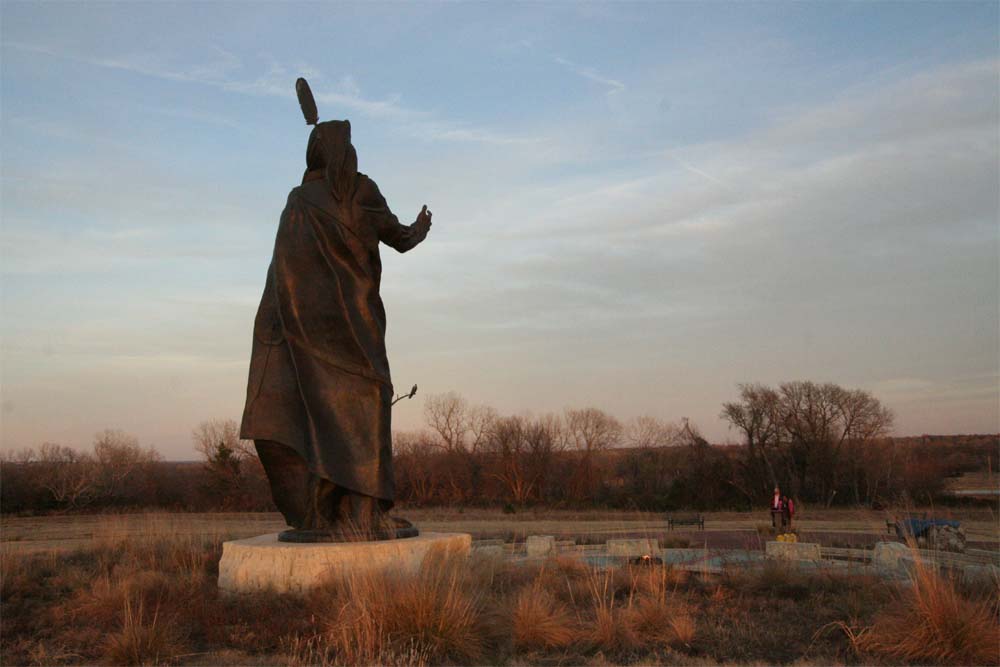This month, the Ponca Nation and a Nebraskan farming family made history at the intersection of the Trail of Tears and the path of the Keystone XL pipeline.
On June 10th, a historic ceremony took place near Neligh, Nebraska. There, Art and Helen Tanderup signed a deed transferring ownership of a 1.6 acre plot of their farmland to the Ponca Nation.
Both have strong connections to the land. Tanderups have farmed the Nebraska soil for generations. The family farm, however, overlaps part of the Ponca’s Trail of Tears, a continuation of the path walked by several Native American peoples exiled from their ancestral land during the 1800s and forcibly relocated wherever the government felt was more convenient. A staggering number died along the way.
For five years, the Tanderup family has partnered with the Ponca Nation to grow the Ponca sacred corn on the farm. According to Art Tanderup, “It is only fitting that out of the tragedy of the Ponca Trail of Tears that a small piece of this historic Trail be transferred to them. It is also fitting that the land where we will plant our fifth crop of Sacred Ponca Corn be theirs as well.”
However, there’s more context behind this gift of land than a tragedy that occurred almost 150 years ago. The Ponca and the Tanderups have found themselves allied against a more modern tragedy they hope to avert. Not only does the tract of gifted land, planted with sacred corn, lie along the Trail of Tears, it’s also in the proposed path of the Keystone XL pipeline. This adds a certain complexity to the pipeline’s path, as TransCanada not only has another landowner to deal with along the route, one with special legal status as a Native American tribe.

Larry Wright, Jr., Chairman of the Ponca Tribe of Nebraska, doesn’t want the pipeline to go through any more than the Tanderups do. “If this adds another layer (of opposition) to that issue, we’re happy to be part of that,” he said.
This alliance between farmers and Native Americans is a grand opportunity for a larger discussion that could take place within our culture. A nation that thinks of itself as the leader of the free world, the United States began as a string of colonies and easily forgets that large swaths of the country still are. After all, what’s colonization all about? Separation. Economically, it’s about separating resources from the people that depend upon them and diverting that wealth to the colonizer’s pockets. Socially, however, wealth for the dominant came at great cost to the colonized: stolen land, theft of labor, rape, genocide, imprisonment, forced religious conversion, the sundering of communities, broken bonds between generations, ecosystems laid waste, and people kept divided.
An honest assessment of the “land of the free” reveals the colonial structure lurking beneath. Farmers in the heartland live and die while at the mercy of tariffs and international markets. First Nations stood up and were shot down by agents of the State and private companies wanting to build a pipeline that has already leaked. Prisoners and people with substance abuse problems, often in custody for the slightest offenses, are compelled to labor for pennies while businesses profit mightily. Coal companies are enjoying a tax cut while blowing up mountains, dumping waste in rivers, and emptying the Black Lung Disability Trust Fund as incidents of black lung disease are spiking. The sacrifice zones contaminated by fracking add to the sacrificed victims of opioid abuse, food deserts, homelessness, and a Puerto Rico that still hasn’t been put right. The inequality gap widens and wealth is sucked upward as we “can’t afford” to fix our rampant health and infrastructure problems, but we’re kept divided by hot-button issues, political horse races, and the culture war.
We’re a conquered people.
However, we don’t have to be. As the Ponca and the Tanderups show us, even enemies nearly as traditional as cowboys and Indians can find common cause. There’s a movement brewing. Can we learn to decolonize ourselves, too?
Related: Dakota Access Pipeline Protests Continue


Join the conversation!